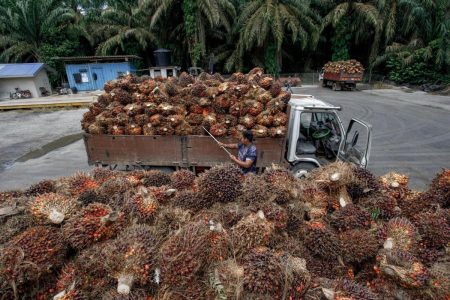(Bloomberg) — Palm oil output in Malaysia, the No. 2 supplier, could rise 5% this year after the government allowed plantations to hire foreign workers, said Joseph Tek, chief executive of the Malaysian Palm Oil Association.
Most Read from Bloomberg
The admission of new workers potentially means that an additional 5.2 million tons of fresh fruit bunches can be harvested, the top growers’ group said in a statement. That translates into 1 million tons of crude palm oil, Tek said.
The extra tonnage would also generate revenue of close to 4 billion ringgit ($845 million), bringing “significant relief” to the industry, which is grappling with a substantial shortage of 40,000 workers, the group said. The news pressured benchmark palm oil futures in Kuala Lumpur trading.
The government has been trying to reduce reliance on cheap foreign labor across many industries including manufacturing, construction and plantations, and seeks to regulate admission processes to prevent any issues like forced labor, worker exploitation and human trafficking.
In March last year, the country temporarily suspended the application and approval process for foreign workers under a quota system in order to speed up the entry of workers already approved.
Chronic Shortage
Malaysia’s palm oil industry is heavily reliant on foreign labor. A chronic shortage of workers resulted in revenue losses estimated at 20 billion ringgit in 2022 and continued to curb growth in output last year.
Palm oil production in Malaysia totaled 18.55 million tons in 2023, and earlier this month the Palm Oil Board, which regulates the industry, predicted output of 18.75 million tons for this year. That’s less than half the supply from top producer Indonesia, where output has expanded steadily in recent years.
The association represents over 40% of the oil palm area in Malaysia. Members include some of the top plantation companies such as Sime Darby Plantation Bhd, Kuala Lumpur Kepong Bhd, IOI Corp. and FGV Holdings Bhd.
Palm oil futures in Kuala Lumpur climbed as much as 0.9% to 3,985 ringgit a ton on Wednesday, before paring gains to 3,955 ringgit by midday.
The higher output estimate is capping the rally, said Gnanasekar Thiagarajan, head of trading and hedging strategies at Kaleesuwari Intercontinental. The move to allow more foreign workers “adds to supply woes,” he said.
–With assistance from Eko Listiyorini.
(Updates with prices in third and penultimate paragraphs, and trader comment in final one)
Most Read from Bloomberg Businessweek
©2024 Bloomberg L.P.

